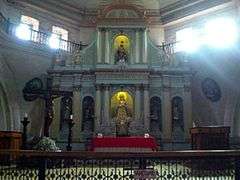San Guillermo Parish Church
San Guillermo Parish Church is named after San Guillermo, the patron saint of Bacolor, Pampanga, Philippines, where the church is erected. The church was originally constructed by the Augustinian Friars in 1576 – also the town's founding – with Padre Diego de Ochoa, OSA, as the town's first parish priest. Having been installed as such two years after.
| Bacolor Church | |
|---|---|
| San Guillermo Parish Church | |
Church facade | |
.svg.png) Bacolor Church .svg.png) Bacolor Church | |
| 15°00′01″N 120°38′54″E | |
| Location | Bacolor, Pampanga |
| Country | Philippines |
| Denomination | Roman Catholic |
| History | |
| Status | Parish church |
| Dedication | San Guillermo |
| Architecture | |
| Functional status | Active |
| Architectural type | Church building |
| Groundbreaking | 1576 |
| Administration | |
| Archdiocese | Roman Catholic Archdiocese of San Fernando |
| Clergy | |
| Archbishop | Florentino G. Lavarias, D.D. |
| Priest(s) | Rev. Fr. Emil Guiao |
In 1880, the church was destroyed by an earthquake only to be rebuilt by Fr. Eugenio Alvarez in 1886. On September 3, 1995, lahar flow from the slopes of Mount Pinatubo which erupted on June 15, 1991, buried the church at half its 12-metre (39 ft) height prompting its more than 50,000 town residents to evacuate to safer grounds in resettlement areas. Near the façade of the parish church is a museum which contains the history of the church. It also contains paintings of the Pinatubo eruption in 1991.
History
Bacolor is one of the oldest towns in the Philippines. The first church was built by the Augustinian friars in 1576 on the lot of Don Guillermo Manabat, a rich landlord believed to be the founder of Bacolor. An earthquake destroyed the church and a new church was built by Fr. Manuel Diaz in 1897. It has a central nave and well-lighted transept with windows. The main retablo, side retablos and pulpit are gilded with gold leaf. The richness of the decoration of Bacolor church depicts the advanced stage of baroque and rococo. In spite of the 1991 eruption of Mount Pinatubo, which half-buried the church on October 1, 1995, the structure is still being used as place of worship. It was already a world-renowned tourist destination before the lahar tragedies; now more tourists flock to the church whose remaining features are being preserved and maintained.[1]
Description
The church features a main retablo, side retablos and a pulpit that are heavily gilded with gold leaves. The rich decorations of the church depict the Baroque style of architecture. Only half of the original facade of the church can be seen today due to the eruption of Mount Pinatubo in 1991 which half-buried the church. After the volcanic eruption, the town's people painstakingly excavated the altar and the retablo and relocated it under the dome in order for the tall wooden retablo to fit. The retablos niches are filled with centuries old statues which were saved from destruction of the lahar. The citizens of Bacolor carefully excavated the ornately carved main and side altars and restored in its immaculate condition. The church is a tourist destination prior to the lahar tragedies and at present has remained being so. The choir area used to be located above the sanctuary but since the lahar occurred, the citizens of Bacolor decided that the area be moved.[2]
Museo de Bacolor
Part of the Church is the Recuerdos Sagrados de Bacolor (Sacred Memorabilia of Bacolor) or Museum.
- Museo de Bacolor
- Interior
- The Recuerdos and Icons
- Jewel in the Crown
Media
This heritage church is part of the main venue for taping of ABS-CBN primetime show May Bukas Pa from February 2, 2009 to February 5, 2010, using the church as their Monastery. The production crew of May Bukas Pa was allowed by Fr. Jesus Manabat Jr. since the show's story has religious themes, and letting the crew film there helped in the maintenance and repair of the whole church compound. The Filipino Channel's aid in exposure led to an influx of foreigners and locals visiting the church.
Gallery
- A view of the church
 Main altar
Main altar- Interior
- Rear view of the church